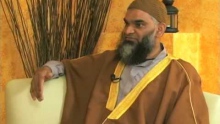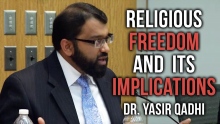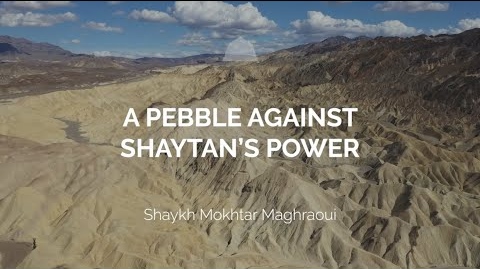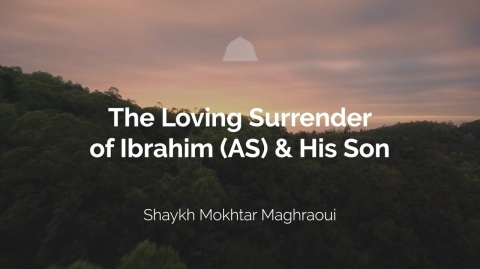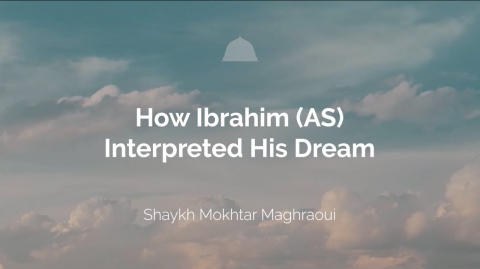When Freedom Hinders the Pursuit of Happiness - By Mokhtar Maghraoui (Peace Series: Session 5)
15 years ago
52:39
4,316 views
Download this lecture from iTunes: http://www.IslamOnDemand.com/283-287iod.html
This lecture is part 5 of a complete series of 5 lectures entitled "In Pursuit of Peace and Happiness":
1) http://www.youtube.com/watch?v=X-_He-8ZILI
2) http://www.youtube.com/watch?v=l-3dDwLSBuw
3) http://www.youtube.com/watch?v=07Dgqn4pVPo
4) http://www.youtube.com/watch?v=bDbC79Et-YE
5) http://www.youtube.com/watch?v=kyw2Jlk2cAM
We are the original producer of this video. Your purchase supports the production of new videos! See our catalog of lectures at http://www.IslamOnDemand.com
In a modern democratic society, freedom is often equated with happiness; that is, in order to attain true happiness one must be free. But when speaking of "freedom" from an Islamic perspective, we must specify what type of freedom we are talking about: freedom of the self or freedom from the self? Secular humanists will champion freedom of the self as an essential component to attaining happiness. But Islam, on the other hand, champions freedom from the self as a means to attaining happiness in this life and the hereafter. In this final session of the seminar "In Pursuit of Peace and Happiness" Imam Mokhtar Maghraoui discusses how Islam views the concept of freedom by emphasizing that the whole mission of Prophet Muhammad (S) was, indeed, to liberate human beings not only from the tyranny and oppression of other people but from the tyranny and oppression of their own lower-self. A very good talk for Muslim youth, especially those attending public schools and colleges where their freedom is tempted everyday by alcohol, pornography, and illicit conduct. Other topics discussed: is there such a thing as absolute freedom for human beings?, Islam's golden rule pertaining to freedom, sanctioned polygamy vs. having many mistresses, the logical inconsistency in the secular definition of "freedom", and many concerning statistics that echo the dangers of absolute freedom.
This lecture is part 5 of a complete series of 5 lectures entitled "In Pursuit of Peace and Happiness":
1) http://www.youtube.com/watch?v=X-_He-8ZILI
2) http://www.youtube.com/watch?v=l-3dDwLSBuw
3) http://www.youtube.com/watch?v=07Dgqn4pVPo
4) http://www.youtube.com/watch?v=bDbC79Et-YE
5) http://www.youtube.com/watch?v=kyw2Jlk2cAM
We are the original producer of this video. Your purchase supports the production of new videos! See our catalog of lectures at http://www.IslamOnDemand.com
In a modern democratic society, freedom is often equated with happiness; that is, in order to attain true happiness one must be free. But when speaking of "freedom" from an Islamic perspective, we must specify what type of freedom we are talking about: freedom of the self or freedom from the self? Secular humanists will champion freedom of the self as an essential component to attaining happiness. But Islam, on the other hand, champions freedom from the self as a means to attaining happiness in this life and the hereafter. In this final session of the seminar "In Pursuit of Peace and Happiness" Imam Mokhtar Maghraoui discusses how Islam views the concept of freedom by emphasizing that the whole mission of Prophet Muhammad (S) was, indeed, to liberate human beings not only from the tyranny and oppression of other people but from the tyranny and oppression of their own lower-self. A very good talk for Muslim youth, especially those attending public schools and colleges where their freedom is tempted everyday by alcohol, pornography, and illicit conduct. Other topics discussed: is there such a thing as absolute freedom for human beings?, Islam's golden rule pertaining to freedom, sanctioned polygamy vs. having many mistresses, the logical inconsistency in the secular definition of "freedom", and many concerning statistics that echo the dangers of absolute freedom.


 English
English Български
Български No filter
No filter
